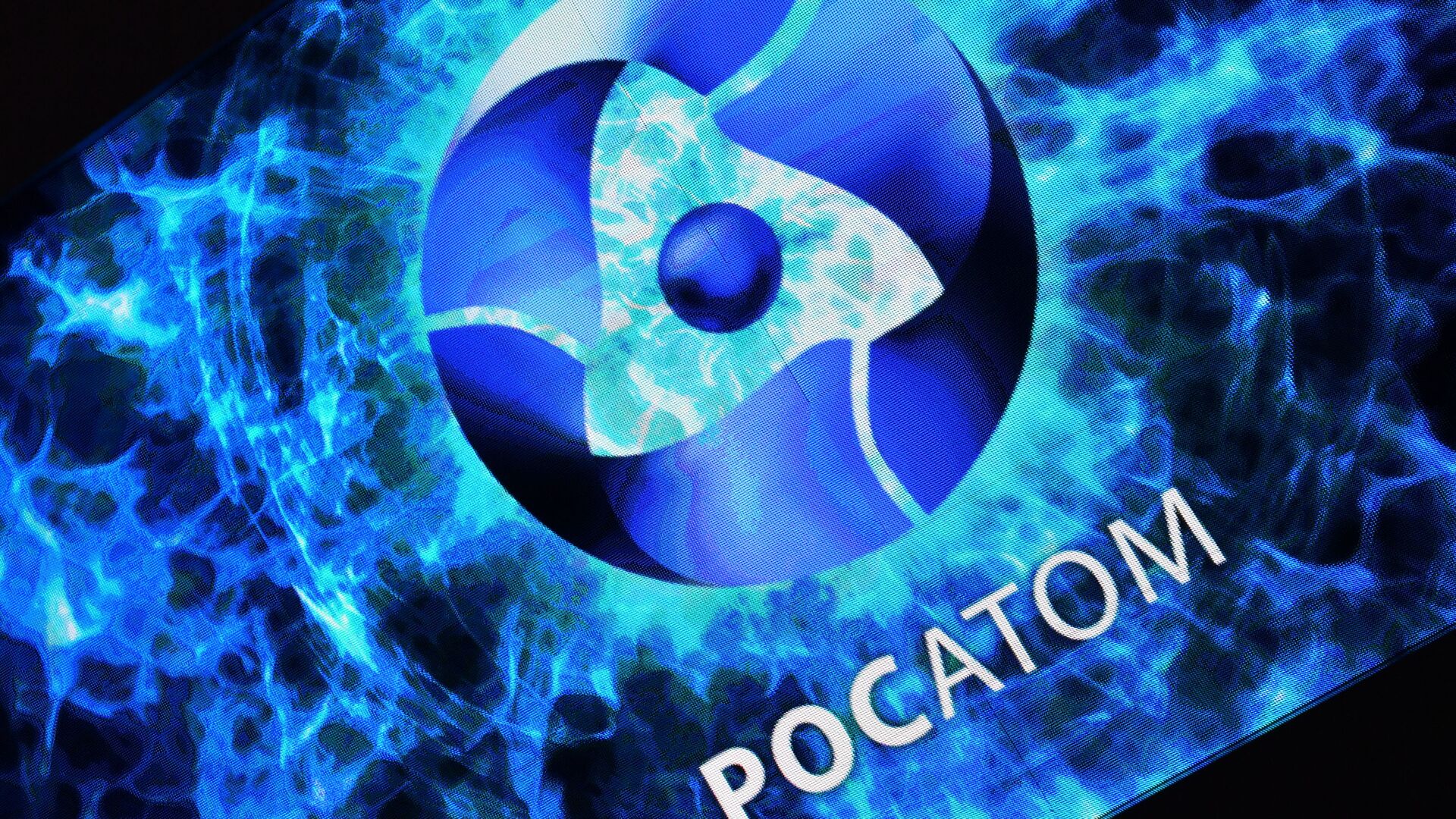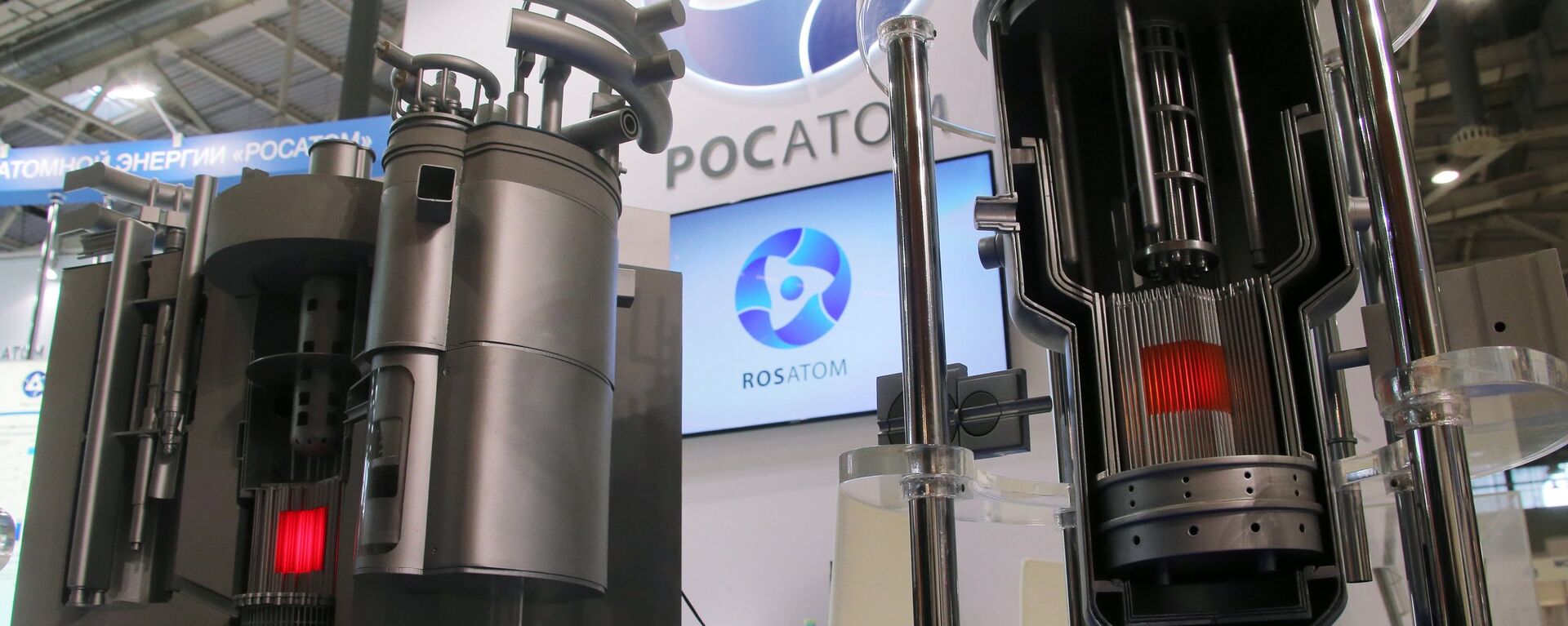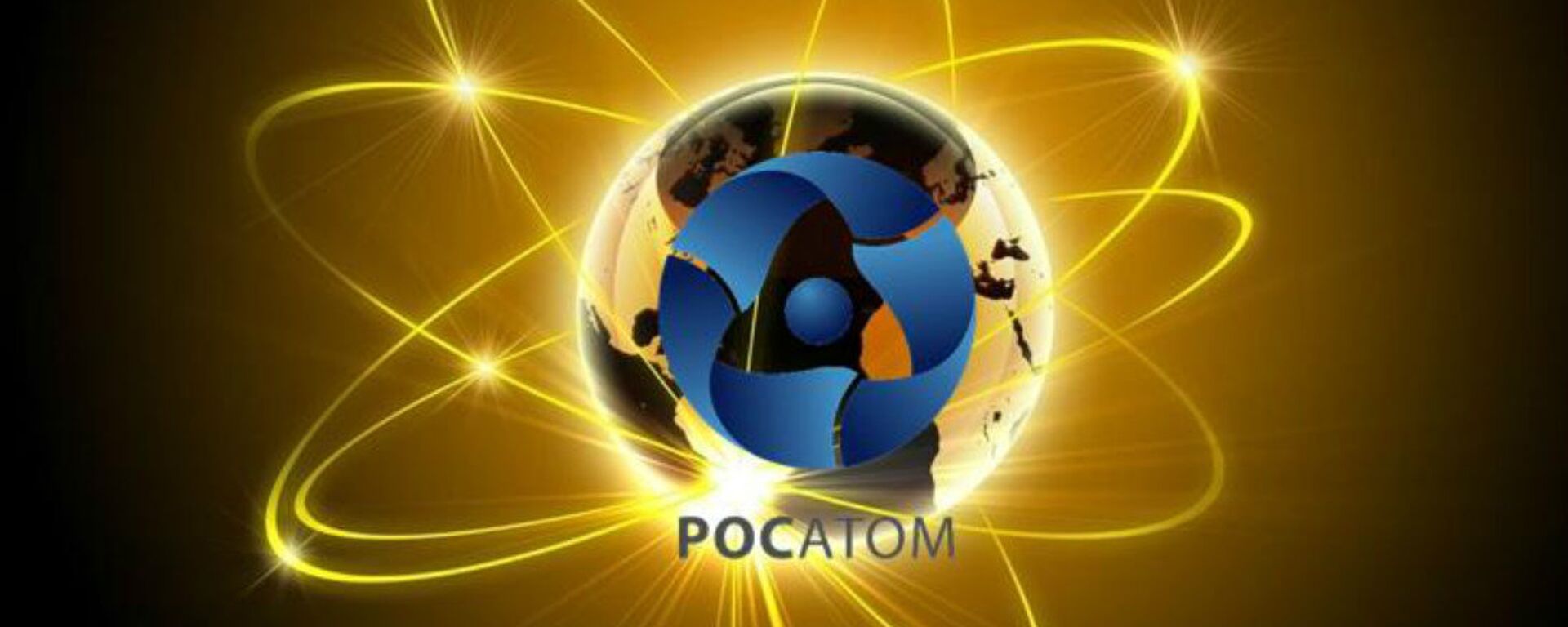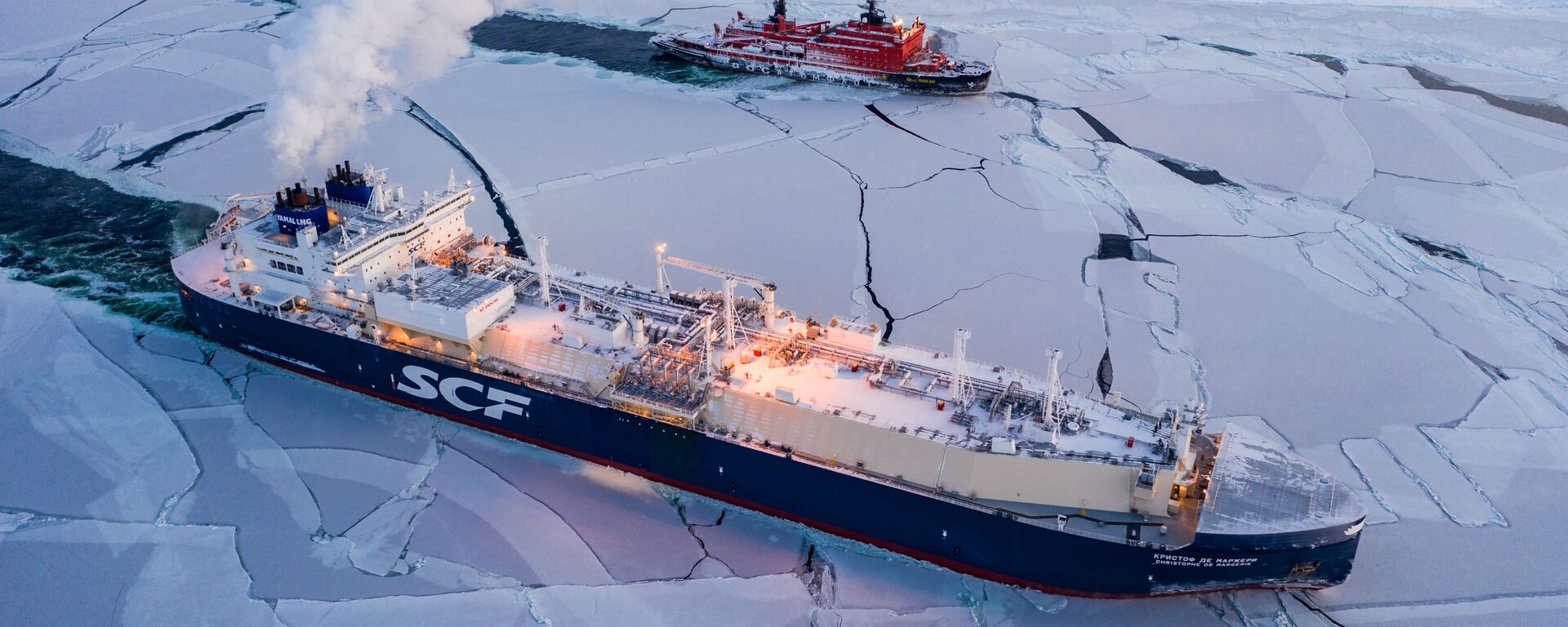https://sputnikglobe.com/20230420/g7-cant-replace-russias-nuclear-fuel-and-expertise-1109708015.html
G7 Can't Replace Russia's Nuclear Fuel and Expertise
G7 Can't Replace Russia's Nuclear Fuel and Expertise
Sputnik International
Five states of the Group of Seven have made a decision to squeeze Russia from the nuclear fuel market in a bid to inflict further damage on the nation's economy after imposing sweeping sanctions on its energy sector.
2023-04-20T17:32+0000
2023-04-20T17:32+0000
2023-06-20T17:10+0000
analysis
russia
us
europe
rosatom
g7
nuclear fuel
akkuyu npp
enriched uranium
tvel
https://cdn1.img.sputnikglobe.com/img/07e5/06/0a/1083118796_0:160:3073:1888_1920x0_80_0_0_2137105053944703307d068c2a93ed0a.jpg
"Those [in G7] who made such a decision [to ban Russian nuclear fuel] considered their financial risks, technological risks, and left it as a last resort," Valery Menshikov, member of the Public Council of Rosatom State Corporation and member of the Council of the Center for Environmental Policy of Russia, told Sputnik. "Like in boxing, the third round or the ninth round is to deal a tougher blow to Russia. This blow, of course, in some sense, will financially affect the positions of Rosatom. I do not know the entire financial structure, and how much Rosatom earns from foreign trade. However, this is not the most painful, sensitive blow for Rosatom. Why? It's because Rosatom has other foreign projects. It is a leader in the construction of new type-reactors in many countries of the Middle East, Egypt, Iran, China, and India."Canada, France, Japan, the UK and the US struck an agreement earlier this week to "leverage the respective resources and capabilities of each country’s civil nuclear power sectors to undermine Russia’s grip on supply chains," according to the group's official statement published on April 16. The agreement envisages pushing Russia "out of the nuclear fuel market entirely" and "as quickly as possible, to cut off another means" for the nation to conduct its special military operation to demilitarize and de-Nazify Ukraine. The decision to reduce dependencies on Russian nuclear fuel came "as the world turns increasingly to nuclear as a source of low-carbon and secure energy," the statement said.Rosatom's Close Ties With EuropeMenshikov has drawn attention to the fact that Russia's state corporation Rosatom and its nuclear fuel cycle company TVEL have maintained longstanding working relations with European states. To illustrate his point he referred to Rosatom's scientific collaboration with the French major energy producers, France’s Électricité de France (EDF) and Framatome. Rosatom also provides services to Europe's nuclear reactors, including in Belgium, the United Kingdom, the Netherlands, Spain, Sweden, and Switzerland."We have built several nuclear power plants mainly in Eastern Europe (…) There is a nuclear power plant in Hungary, where, by the way, we won a tender, and today we are continuing to build two more modern units based on our rich experience in building the world's best, in a technical sense, reactors of new type," Menshikov said.Shifting to Other Producers of Nuclear Fraught With RisksHaving severed contracts with Rosatom's TVEL, European countries would have to produce their nuclear fuel somewhere else; however, it's unclear whether this fuel will be safe or reliable. Attempts to use nuclear fuel from the US manufacturer Westinghouse inside reactors of the Czech Republic’s Soviet-designed Temelin nuclear power plant led to unexpected setbacks and problems. In January 2007, the Temelin NPP saw considerable problems with fuel which caused an emergency shutdown of the entire unit. The reactor was restarted only three months later. In May 2007, it turned out that Westinghouse fuel assemblies had been strongly deformed in the process of operation which prompted the Czechs to remove them from the Temelin’s reactors ahead of schedule. In 2010, the Czech NPP resumed the use of Russia-manufactured fuel by signing a ten-year-long contract.Nonetheless, in June 2022, Czech state-controlled utility ČEZ inked a 15-year agreement with Westinghouse Electric and France’s Framatome to replace Russia's fuel assemblies for the Temelin starting from 2024. ČEZ did not conceal that the decision was politically motivated, stating that it had chosen Framatome and Westinghouse in the aftermath of the beginning of Russia's special military operation.Ban on Nuclear Fuel is Part of Anti-Russia Energy EmbargoThe EU's decision to ban Russia's fossil fuels has backfired on the bloc, giving a boost to already-soaring prices and accelerating inflation. Europeans had to replace Russia's relatively cheap pipeline gas with American LNG and reduce the fuel consumption which prompted some big EU enterprises to relocate their production facilities to other countries, resorting to massive lay-offs. Likewise, the move to sever Europe's ties with Rosatom spearheaded by the G7 could lead to unintended consequences, according to Professor Joe Siracusa, dean of Global Futures at Curtin University in Perth, Australia."These nuclear supply lines are even harder to break than the reliance in Europe on oil and gas," Siracusa told Sputnik, citing the fact that unlike natural gas or oil, uranium should be specifically enriched before becoming a fuel for nuclear power plants.One should bear in mind that Russia's forte is uranium enrichment, the key to the creation of nuclear fuel. All in all, Rosatom covers 16.3% of the global nuclear fuel market.As of 2020, Russia owned 40% of the total uranium conversion infrastructure in the world, and 46% of the world's total uranium enrichment capacity in 2018, according to a 2022 Columbia University’s Center on Global Energy Policy report.According to last year's report, Canada, France, Germany, the Netherlands, the UK and the US "are enough to replace at least some" of the conversion and enrichment needed by Western nuclear reactors, but it's unclear whether they will be able to "fully replace" Russian capacity. The report admitted that more investment in mining, conversion, and enrichment facilities may be necessary to "fully extricate Western nuclear fuel chains from Russian involvement."Indeed, China is boosting nuclear cooperation with Rosatom regardless of sanctions. The Russian atomic giant is also providing services to Iran’s reactor at Bushehr. At the same time, it is stepping up cooperation with Turkiye on its first fleet of four VVER-1200 reactors at the Akkuyu nuclear power plant. Likewise, Hungary is moving forward with the construction of two Russia-made new VVER-1200s at its Paks II nuclear power plant. Rosatom is also building nuclear reactors for Egypt’s El Dabaa plant, developing nuclear cooperation with India and Bangladesh, and working on a nuclear technology center in Bolivia, to name but a few projects.Nobody Will Benefit From Ban on Russia's Nuclear IndustryThe ongoing effort to expel Russia's Rosatom from the market does not benefit those countries who are trying to implement it or the international community in general, according to Menshikov. The crux of the matter is that Russia's nuclear industry is not limited to building atomic stations and providing fuel to them. Russia's nuclear scientists have mastered themselves in nuclear design and research; Rosatom provides nuclear and engineering education services across the world to both mature specialists and students, according to the expert. "No one, except for Rosatom, is doing such work," Menshikov underscored.
https://sputnikglobe.com/20230418/europe-ditching-russias-nuclear-fuel-will-come-at-high-price-1109631547.html
https://sputnikglobe.com/20230226/ironclad-ties-why-eu-avoids-sanctioning-russias-nuclear-sector-1107820722.html
https://sputnikglobe.com/20220720/welcome-to-nuclear-club-how-russias-rosatom-helps-egypt-fulfill-its-technological-dream-1097623991.html
https://sputnikglobe.com/20230327/new-russian-nuclear-powered-icebreaker-to-be-laid-down-in-may-next-year---rosatom-1108811249.html
https://sputnikglobe.com/20230330/russias-rosatom-announces-agreement-to-build-172-megawatt-wind-farm-in-myanmar-1108947264.html
russia
czech republic
Sputnik International
feedback@sputniknews.com
+74956456601
MIA „Rossiya Segodnya“
2023
News
en_EN
Sputnik International
feedback@sputniknews.com
+74956456601
MIA „Rossiya Segodnya“
Sputnik International
feedback@sputniknews.com
+74956456601
MIA „Rossiya Segodnya“
russia's rosatom, g7's ban on russian nuclear fuel, russian-made nuclear reactors in europe, russo-french nuclear cooperation, tvel nuclear fuel, westinghouse nuclear fuel, russian nuclear reactors hungary, rosatom uranium enrichment, rosatom research centers
russia's rosatom, g7's ban on russian nuclear fuel, russian-made nuclear reactors in europe, russo-french nuclear cooperation, tvel nuclear fuel, westinghouse nuclear fuel, russian nuclear reactors hungary, rosatom uranium enrichment, rosatom research centers
G7 Can't Replace Russia's Nuclear Fuel and Expertise
17:32 GMT 20.04.2023 (Updated: 17:10 GMT 20.06.2023) Five states of the Group of Seven have made a decision to squeeze Russia from the nuclear fuel market in a bid to inflict further damage on the nation's economy. The move follows sweeping sanctions on its energy sector amid Moscow's special operation in Ukraine. How could this decision affect global nuclear industries?
"Those [in G7] who made such a decision [to ban Russian nuclear fuel] considered their financial risks, technological risks, and left it as a last resort," Valery Menshikov, member of the Public Council of Rosatom State Corporation and member of the Council of the Center for Environmental Policy of Russia, told Sputnik.
"Like in boxing, the third round or the ninth round is to deal a tougher blow to Russia. This blow, of course, in some sense, will financially affect the positions of Rosatom. I do not know the entire financial structure, and how much Rosatom earns from foreign trade. However, this is not the most painful, sensitive blow for Rosatom. Why? It's because Rosatom has other foreign projects. It is a leader in the construction of new type-reactors in many countries of the Middle East, Egypt, Iran, China, and India."
Canada, France, Japan, the UK and the US struck an agreement earlier this week to "leverage the respective resources and capabilities of each country’s civil nuclear power sectors
to undermine Russia’s grip on supply chains," according to the group's official statement published on April 16.
The agreement envisages pushing Russia "out of the nuclear fuel market entirely" and "as quickly as possible, to cut off another means" for the nation to conduct its special military operation to demilitarize and de-Nazify Ukraine. The decision to reduce dependencies on Russian nuclear fuel came "as the world turns increasingly to nuclear as a source of low-carbon and secure energy," the statement said.
Rosatom's Close Ties With Europe
Menshikov has drawn attention to the fact that Russia's state corporation Rosatom and its nuclear fuel cycle company TVEL have maintained longstanding working relations with European states.
To illustrate his point he referred to Rosatom's scientific collaboration with the French major energy producers, France’s Électricité de France (EDF) and Framatome. Rosatom also provides services to Europe's nuclear reactors, including in Belgium, the United Kingdom, the Netherlands, Spain, Sweden, and Switzerland.
"We have built several nuclear power plants mainly in Eastern Europe (…) There is a nuclear power plant in Hungary, where, by the way, we won a tender, and today we are continuing to build two more modern units based on our rich experience in building the world's best, in a technical sense, reactors of new type," Menshikov said.
"There are [Russia-built] stations in several other European countries: in the Czech Republic, Slovakia, and Bulgaria, where we supplied our fresh fuel. And vice versa, there was an agreement: we took their spent nuclear fuel back to Russia with the obligation to return the radioactive waste to these countries after we processed this fuel. Therefore, the connections here were quite large. That is, technically, technologically, and financially, we created certain contractual relations," the Rosatom expert continued.
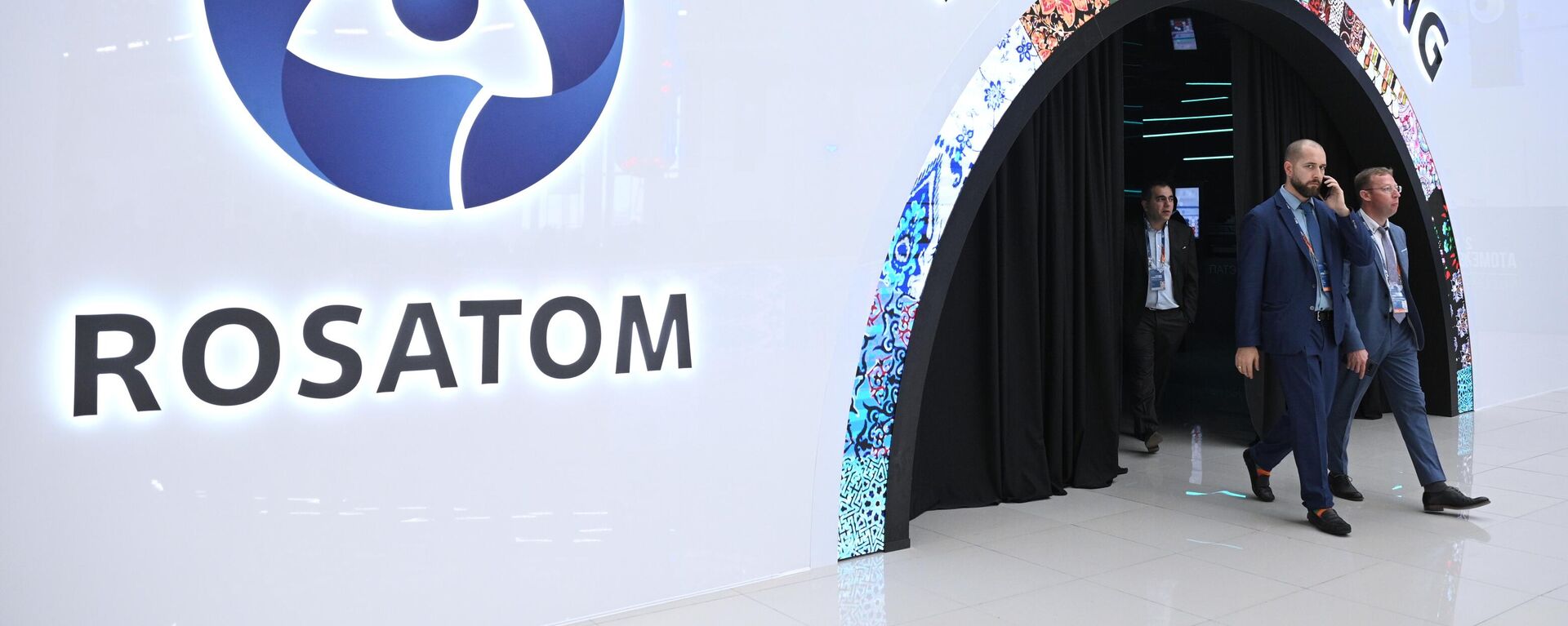
26 February 2023, 13:31 GMT
Shifting to Other Producers of Nuclear Fraught With Risks
Having severed contracts with Rosatom's TVEL, European countries would have to produce their nuclear fuel somewhere else; however, it's unclear whether this fuel will be safe or reliable.
Attempts to use nuclear fuel from the US manufacturer Westinghouse inside reactors of the Czech Republic’s Soviet-designed Temelin nuclear power plant led to unexpected setbacks and problems.
In January 2007, the Temelin NPP saw considerable problems with fuel which caused an emergency shutdown of the entire unit. The reactor was restarted only three months later. In May 2007, it turned out that Westinghouse fuel assemblies had been strongly deformed in the process of operation which prompted the Czechs to remove them from the Temelin’s reactors ahead of schedule. In 2010, the Czech NPP resumed the use of Russia-manufactured fuel by signing a ten-year-long contract.
There have already been attempts in the Czech Republic to replace our fuel with fuel from the American company Westinghouse. This led to an accident. The Czechs turned to us at that moment, because they failed to cope with it on their own. And our specialists solved that problem. In general, as you can see, there have already been cases like this. Then there was the process of replacing Russian fuel [with Westinghouse fuel] at Ukrainian nuclear power plants. This was also accompanied with great security risks. In general, this shift is political at the expense of security. And in this sense, there is a very big risk.
Valery Menshikov
Member of the Public Council of Rosatom State Corporation and the Council of the Center for Environmental Policy of Russia
Nonetheless, in June 2022, Czech state-controlled utility ČEZ inked a 15-year agreement with Westinghouse Electric and France’s Framatome to replace Russia's fuel assemblies for the Temelin starting from 2024. ČEZ did not conceal that the decision was politically motivated, stating that it had chosen Framatome and Westinghouse in the aftermath of the beginning of Russia's special military operation.
Ban on Nuclear Fuel is Part of Anti-Russia Energy Embargo
The EU's decision to ban Russia's fossil fuels has backfired on the bloc, giving a boost to already-soaring prices and accelerating inflation.
Europeans had to replace Russia's relatively cheap pipeline gas with American LNG and reduce the fuel consumption which prompted some big EU enterprises to relocate their production facilities to other countries, resorting to massive lay-offs.
Likewise, the move to sever Europe's ties with Rosatom spearheaded by the G7 could lead to unintended consequences, according to Professor Joe Siracusa, dean of Global Futures at Curtin University in Perth, Australia.
"These nuclear supply lines are even harder to break than the reliance in Europe on oil and gas," Siracusa told Sputnik, citing the fact that unlike natural gas or oil, uranium should be specifically enriched before becoming a fuel for nuclear power plants.
One should bear in mind that Russia's forte is uranium enrichment, the key to the creation of nuclear fuel. All in all, Rosatom covers 16.3% of the global nuclear fuel market.
"Apart from France, we have the most powerful production of fresh fuel," Menshikov explained. "It is necessary to enrich natural uranium. The only isotope suitable for nuclear energy is U-235; its percentage in the uranium ore is less than 1%. In order to make fresh fuel, it must be enriched up to about 4%. This is a most difficult task, which in all technological aspects is best and most efficiently performed by Russia on its centrifuges. Therefore, let's see how they can manage to do this without Russia. That is, huge financial opportunities will be missed if one starts buying fresh fuel, enriched in U-235 isotope, somewhere else."
As of 2020, Russia owned 40% of the total uranium conversion infrastructure in the world, and 46% of the world's total uranium enrichment capacity in 2018, according to a 2022 Columbia University’s Center on Global Energy Policy report.
According to last year's report, Canada, France, Germany, the Netherlands, the UK and the US "are enough to replace at least some" of the conversion and enrichment needed by Western nuclear reactors, but it's unclear whether they will be able to "fully replace" Russian capacity. The report admitted that more investment in mining, conversion, and enrichment facilities may be necessary to "fully extricate Western nuclear fuel chains from Russian involvement."
"Sanctions do not work," Siracusa argued. "And this kind of sanctions here, I think, poisons not only diplomacy, but the prospects of a cease-fire and makes the situation more and more difficult. I mean, the idea of changing the global energy landscape is so that these Western powers, including Japan, Canada, France, the United Kingdom, the United States, can replace the nuclear fuel supply chains, Russian supply chains, with their own. This proposal to punish the Russian government is also tied up with a promise to increase the domestic situation in these countries in terms of getting rid of coal and things like that. On the one hand, they're trying to punish Russia and none of this works. 140 of the 193 nations in the world, they're not signing up to sanctions. This is just a very Western thing."
Indeed, China is boosting nuclear cooperation with Rosatom regardless of sanctions. The Russian atomic giant is also providing services to Iran’s reactor at Bushehr. At the same time, it is stepping up cooperation with Turkiye on its first fleet of four VVER-1200 reactors at the Akkuyu nuclear power plant. Likewise, Hungary is moving forward with the construction of two Russia-made new VVER-1200s at its Paks II nuclear power plant. Rosatom is also building nuclear reactors for Egypt’s El Dabaa plant, developing nuclear cooperation with India and Bangladesh, and
working on a nuclear technology center in Bolivia, to name but a few projects.
Nobody Will Benefit From Ban on Russia's Nuclear Industry
The ongoing effort to expel Russia's Rosatom from the market does not benefit those countries who are trying to implement it or the international community in general, according to Menshikov.
The crux of the matter is that Russia's nuclear industry is not limited to building atomic stations and providing fuel to them. Russia's nuclear scientists have mastered themselves
in nuclear design and research; Rosatom provides nuclear and engineering education services across the world to both mature specialists and students, according to the expert. "No one, except for Rosatom, is doing such work," Menshikov underscored.
"And most importantly, we have indeed created the safest reactor units. No one in the world so far has the same technologically complex devices, called the '3+' generation, capable of creating such a power. We have an advantage in this regard, and therefore we win tenders," the Rosatom expert concluded.
